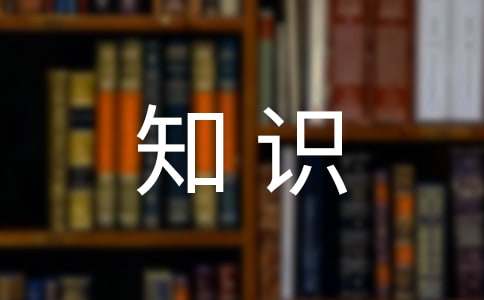英语初三知识点精选汇总人教版
上学期间,说起知识点,应该没有人不熟悉吧?知识点是知识中的最小单位,最具体的内容,有时候也叫“考点”。还在为没有系统的知识点而发愁吗?以下是小编精心整理的英语初三知识点精选汇总人教版,欢迎大家分享。

英语初三知识点 1
1. by + doing通过……方式如:by studying with a group
by还可以表示:“在…旁”、“靠近”、“在…期间”、“用、”“经过”、“乘车”等
如:I live by the river. I have to go back by ten oclock.
The thief entered the room by the window. The student went to park by bus.
2. talk about谈论,议论,讨论
如:The students often talk about movie after class.学生们常常在课后讨论电影。
talk to sb. === talk with sb.与某人说话
3.提建议的句子:
①What/ how about +doing sth.?
如:What/ How about going shopping?
②Why dont you + do sth.?如:Why dont you go shopping?
③Why not + do sth. ?如:Why not go shopping?
④Lets + do sth.如:Lets go shopping
⑤Shall we/ I + do sth.?如:Shall we/ I go shopping?
4. a lot许多常用于句末如:I eat a lot.我吃了许多。
5. too…to太…而不能常用的句型too+adj./adv. + to do sth.
如:Im too tired to say anything.我太累了,什么都不想说。
6. aloud, loud与loudly的用法
三个词都与"大声"或"响亮"有关。
①aloud是副词,重点在出声能让人听见,但声音不一定很大,常用在读书或说话上。通常放在动词之后。aloud没有比较级
形式。如: He read the story aloud to his son.
他朗读那篇故事给他儿子听。
②loud可作形容词或副词。用作副词时,常与speak, talk,laugh等动词连用,多用于比较级,须放在动词之后。如:
She told us to speak a little louder.她让我们说大声一点。
③loudly是副词,与loud同义,有时两者可替换使用,但往往
含有令人讨厌或打扰别人的意思,可位于动词之前或之后。如: He does not talk loudly or laugh loudly in public.他不当众大声谈笑。
【Unit2】
1. used to do sth.过去常常做某事
否定形式:didnt use to do sth. / used not to do sth.
如:He used to play football after school.放学后他过去常常踢足球。
Did he use to play football? Yes, I did. No, I didnt.
He didnt use to smoke.他过去不吸烟。
2.反意疑问句
①肯定陈述句+否定提问如:Lily is a student, isnt she?
Lily will go to China, wont she?
②否定陈述句+肯定提问如:
She doesnt come from China, does she?
You havent finished homework, have you?
③提问部分用代词而不用名词Lily is a student, isnt she?
④陈述句中含有否定意义的词,如:little, few, never, nothing, hardly等。其反意疑问句用肯定式。如:
He knows little English, does he?他一点也不懂英语,不是吗?
They hardly understood it, did they?他们几乎不明白,不是吗?
3. play the piano弹钢琴
4. ①be interested in sth.对…感兴趣
②be interested in doing sth.对做…感兴趣
如:He is interested in math, but he isnt interested in speaking
English.他对数学感兴趣,但是他对说英语不感兴趣。
5. interested adj.感兴趣的,指人对某事物感兴趣,往往主语是人
interesting adj.有趣的,指某事物/某人具有趣味,主语往往是物
6. still仍然,还
用在be动词的后面如:Im still a student.
用在行为动词的前面如:I still love him.
7. the dark天黑,晚上,黑暗
8.害怕… be terrified of sth.如:I am terrified of the dog.
be terrified of doing sth.如:I am terrified of speaking.
【Unit3】
1. allow sb. to do sth.允许某人做某事(主动语态)如:
Mother allows me to watch TV every night.妈妈允许我每晚看电视。
be allowed to do sth.被允许做某事(被动语态)如:
LiLy is allowed to go to Qinzhou.莉莉被允许去钦州。
2. get their ears pierced穿耳洞
让/使(别人)做某事get sth. done(过去分词)
have sth. done如:
I get my car made. == I have my car made.我让别人修好我的车
3. enough足够
形容词+enough如:beautiful enough足够漂亮
enough+名词如:enough food足够食物
enough to足够…去做…如:
I have enough money to go to Beijing.我有足够的钱去北京。
She is old enough to go to school.她够大去读书了。
4. stop doing sth.停止做某事Please stop speaking.请停止说话。
stop to do sth.停止下来去做某事Please stop to speak.
请停下来说话。
5.看起来好像…sb. seem to do sth. He seems to feel very sad.
it seems that +从句It seems that he feels very sad.他看起来好像很伤心。
6.系动词不能独立作谓语,要和表语一起构成谓语。常用的连系动词有:look, feel, be, become, get, turn, smell, taste, stay(保持), kept等。连系动词除be和become等少数词可接名词作表语外,一般都是接形容词。如:
They are very happy. He became a doctor two years ago.
She felt very tired.
英语初三知识点
一、介词篇:
1.介词的功能
介词是一种虚词,用来表示名词或相当于名词的其它词语句中其它词的关系,不能单独使用。介词可与名词或相当于名词的其它词构成介词短语。介词短语可在句中作定语,状语,表语和宾语补足语。例如:
The boy over there is John’s brother. (定语)
The girl will be back in two hours. (状语)
Our English teacher is from Australia. (表语)
Help yourself to some fish. (宾语补足语)
2.常用介词的用法辨析
(1)表时间的介词
at, in on
表示时间点用at。例如:at six o’clock, at noon, at midnight。表示在某个世纪,某年,某月,某个季节以及早晨,上午,下午,晚上时,用in。例如:in the ninettenth century, in 2002, in may, in winter, in the morning, in the afternoon等。表示具体的某一天和某一天的上午,下午,晚上时,用on。例如:on Monday, on July 1st, on Sunday morning等。
since, after
由since和after 引导的词组都可表示从过去某一点开始的时段,但since词组表示的时段一直延续到说话的时刻,因而往往要与现在完成时连用。而after词组所表示的时段纯系过去,因而要与一般过去时连用。例如:
I haven’t heard from him since last summer.
After five days the boy came back.
in, after
in与将来时态连用时,表示“过多长时间以后”的意思,后面跟表示一段时间的词语。After与将来时态连用时,后面只能跟表示时间点的词语。After与过去时态连用时,后面才能跟表示一段时间的词语。例如:
He will be back in two months.
He will arrive after four o’clock.
He returned after a month.
(2)表示地点的介词
at, in, on
at一般指小地方;in一般指大地方或某个范围之内;on往往表示“在某个物体的表面”。例如:
He arrived in Shanghai yesterday.
They arrived at a small village before dark.
There is a big hole in the wall.
The teacher put up a picture on the wall.
over, above, on
over, on和above都可表示“在……上面”,但具体含义不同。Over表示位置高于某物,在某物的正上方,其反义词是under。 above也表示位置高于某物,但不一定在正上方,其反义词是below。On指两个物体表面接触,一个在另一的上面。例如:
There is a bridge over the river.
We flew above the clouds.
They put some flowers on the teacher’s desk.
across, through
across和through均可表示“从这一边到另一边”,但用法不同。Across的含义与on有关,表示动作在某一物体的表面进行。Throgh的含义与in有关,表示动作是在三维空间进行。例如:
The dog ran across the grass.
The boy swam across the river.
They walked through the forest.
I pushed through the crowds.
in front of, in the front of
in front of 表示“在某人或某物的前面”,在某个范围以外;in the front of 表示“在……的前部”,在某个范围以内。例如:
There are some tall trees in front of the building.
The teacher is sitting in the front of the classroom.
3.介词的固定搭配
介词往往同其他词类形成了固定搭配关系。记住这种固定搭配关系,才能正确使用介词。
(1)介词与动词的搭配
listen to , laugh at, get to, look for wait for, hear from, turn on, turn off, worry about, think of, look after, spend…on…, 等。
(2)介词与名词的搭配
on time, in time, by bus, on foot, with pleasure, on one’s way to, in trouble, at breakfast, at the end of, in the end等。
(3)介词与形容词的搭配
be late for, be afraid of, be good at, be interested in, be angry with, be full of, be sorry for等。
二、动词篇:
1.短语动词的分类
(1)动词+介词
常见的有look for, look after, ask for, laugh at, hear of 等。这类短语动词的宾语只能放在介词后。如:
Don’t laugh at others.
Tom asked his parents for a bike.
(2)动词+副词
常见的有give up, pick up, think over, find out, hand in,等。这类短语动词的宾语如果是名词,既可放在副词前边,又可放在副词后边;宾语如果是人称代词或反身代词,则要放在副词前边。如:
You’ll hand in your homework tomorrow.
Please don’t forget to hand it in.
(3)动词+副词+介词
常见的有 go on with, catch up with等。这类短语动词的宾语只能放在介词后边。如:
Go on and I’ll catch up with you in five minutes.
After a short rest, he went on with his research work.
(4)动词+名词+介词
常见的有take care of, make use of, pay attention to, make fun of 等。这类短语动词的宾语只能放在介词后边。如:
You should pay attention to your handwriting.
We should make full use of our time.
(5)动词+形容词
常见的有leave open, set free, cut open等。这类短语动词的宾语如果是名词,则宾语可放在形容词的前边,也可放在后边;宾语如果是人称代词或反身代词,则必须放在形容词前边。如:
The prisoners were set free.
He cut it open.
(6)动词+名词
常见的有take place, make friends等。这类短语动词用作不及物动词。如:
This story took place three years ago.
I make friends with a lot of people.
【英语初三知识点】相关文章:
初三英语疑问代词的用法知识点10-19
初三英语上册合成动词知识点02-06
初三英语集合名词知识点归纳08-10
初三上学期英语知识点02-02
初三物理知识点12-02
初三的语文知识点02-05
初三物理知识点05-07
初三物理功率知识点11-30
初三物理知识点整理12-02
初三物理重要知识点07-24